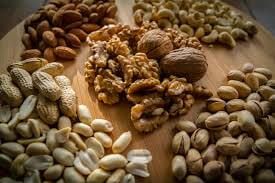Fueling Plant-Based Performance

By Xonzy Gaddis, Swimming World College Intern.
When it comes to having a plant-based diet as an aquatic athlete, mealtime is not as easy as dumping just any food on your plate. According to the United States Department of Agriculture and Office of Disease Prevention and Health Promotion, swimmers should average more than 2,500 calories a day for their meals. While this average can change drastically per individual, this can serve as a quality benchmark for which swimmers can aim. Making the choice to become a vegetarian or vegan calls for more forethought in meal-planning for athletes.
When creating these meals, swimmers should make sure they incorporate Omega 3 Fatty Acids, vitamin D, vitamin B-12, zinc, iron, calcium, and lots of carbohydrates. According to a study done by Dr. Susan Barr and Dr. Candice Rideout, vegetarian athletes are more at risk for iron deficiency, which decreases their performance in endurance activities. Due to this risk, vegetarian meals for athletes require a higher amount of food to be consumed. The meal below features all of these critical nutrients to reach a healthy yet satisfying result.
For Starters…

Photo Courtesy: Pixabay
A great way to start off any meal is with a salad. Salads are simple and can have absolutely anything thrown into them to round out the perfect meal. One salad which is loaded with a great amount of carbohydrates and protein is a cranberry walnut and almond salad. With about a cup of almonds, a cup of cranberries, a cup of walnuts, and half a head of lettuce tossed together, an athlete ends up getting nearly a 250-calorie intake. About 45 percent of the salad is made up of carbohydrates, which is one of the greatest components in giving any swimmer enough energy to make it across the pool.
Another 12 to 15 percent of the salad is protein packed, which mostly comes from the walnuts and almonds. Protein allows for the construction of body cells and can fuel the body mostly when one is low on energy. Those walnuts also provide swimmers with tons of Omega 3 Fatty Acids, which allow for the reduction of inflammation in the body, leading to decreased risk of trauma to the muscles. Lastly, about 6 to 8 percent of this salad contains iron – a mineral which is vital to several bodily processes and allows a swimmers’ endurance to improve.
The Main Event

Photo Courtesy: Pixabay
Everyone is always ready for an excellent entrée! One entrée that packs a punch with a whopping 65 grams of carbohydrates is a roasted butternut squash pasta with peas. This meal is cooked with absolutely any pasta you may like, yet it also comes with ricotta cheese, any dairy-free milk, butternut squash, olive oil, peas, garlic, olive oil, and a dash of salt (or pepper). A pasta dinner can also be loaded with any ingredients of your choice – just like the way salad can be – because when it comes down to it, it’s all about the carbohydrates in pasta. The roasted butternut squash pasta dinner provides a person with between 340 to 350 calories. About 6 percent of the calcium in this meal comes from the roasted butternut squash. Moreover, calcium allows for healthier bone formation and reduces the risk of hormonal health decline.
Satisfying the Sweet Tooth

Photo Courtesy: Flickr
Finally, a full meal is not complete until dessert is served. A great way to get the right amount of Vitamin B-12 is nondairy milk products or dairy products. Take a trip on the tropical side and make a coconut milk ice cream: simply add coconut milk, vanilla, sweetener, salt, vanilla extract, and any other delectable flavors to cool the palate. This coconut milk ice cream satisfies any sweet tooth and also contains about 1.2 micrograms of Vitamin B-12. That is more than half the recommended daily amount! Vitamin B-12 reduces fatigue, increases red blood cell production and fixes hormonal imbalance. This coconut milk ice cream has about 200 calories, which leads to a meal total of 800 calories!
With 800 calories for dinner, who knows what is cooking for breakfast and lunch to reach the 2,500 goal? Always remember to include a couple of snacks spread out between each meal to stay energized throughout the day, especially during practices and competitions!
All commentaries are the opinion of the author and do not necessarily reflect the views of Swimming World Magazine nor its staff.




Roasted butternut squash pasta sounds yummy! I’ll have to try that sometime
Darian.